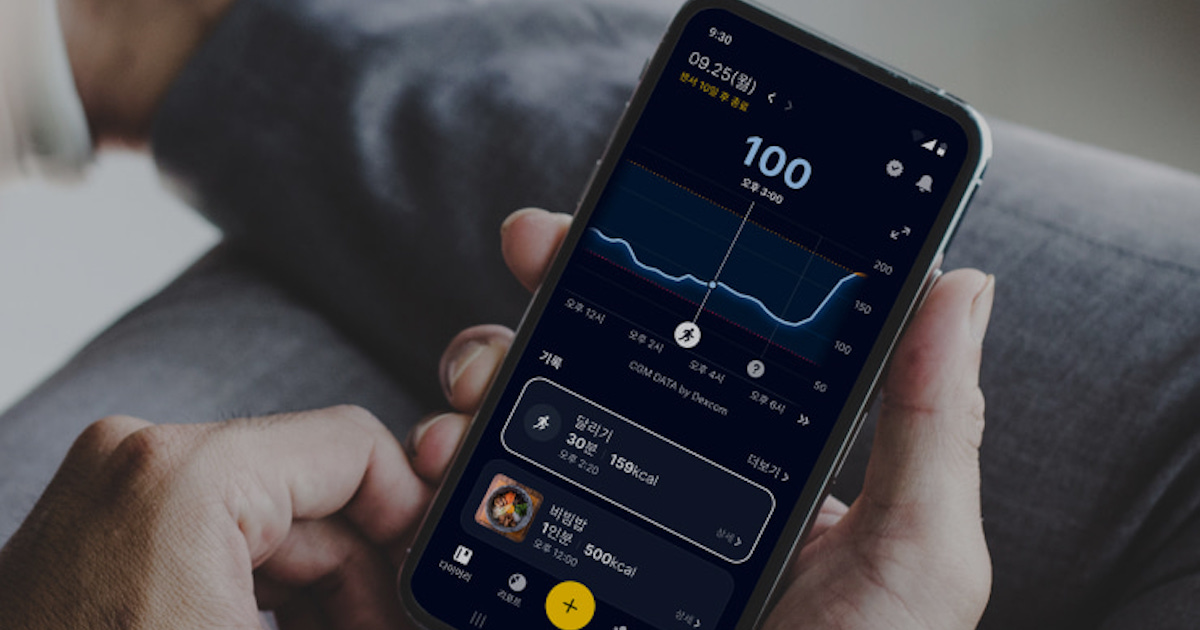
Photo courtesy of Kakao Healthcare
Kakao Healthcare has unveiled its latest AI-driven mobile diabetes management app.
Called PASTA (Personalised, Accessible, Supportive, Tech-enabled, and Affordable), the app currently links to two CGM devices: CareSens Air by local manufacturer i-SENS and Dexcom's G7. The app will also pair with the Mallya smart cap for insulin pens by the second quarter.
Once the CGM device is linked, the app automatically displays details about the user's blood sugar in real-time via Bluetooth. It also allows users to record their meals, exercise, insulin doses, and medication. The app features vision AI that automatically provides information about nutrition, calories, and food types of their meals.
Another feature is a handy summary report of the user's blood sugar reading with indicators pointing out which ones are good and bad. These summaries are also made available for sharing with the user's family. It can also provide a guide to managing blood sugar levels and creating healthy lifestyle habits.
Now available on both Android and iOS devices, the PASTA app was named as such, likening the many ways to manage diabetes to the variety of pasta.
Meanwhile, Kakao Healthcare developed Pasta Connect Pro, a dashboard for doctors where they can check their patients' blood sugar trends and lifestyle changes in near real time. It is planned to be linked with hospital EMRs to provide convenience of data input to staff and patients.
In a statement, Kakao Healthcare disclosed its plans to expand its latest digital diabetes management app and service internationally, starting in Japan this year.
Seegene, a provider of PCR-based (polymerase chain reaction) diagnostic solutions from South Korea, has onboarded Microsoft as a tech partner to its SG OneSystem, which collaborates with scientists and experts globally to develop syndromic quantitative PCR diagnostic tests.
A host of Microsoft services will be incorporated into Seegene's Digitalised Development System (SGDSS) which powers the SG OneSystem.
For one, it will integrate Microsoft Azure services, including the Azure OpenAI Service, to support data interaction and analysis for researchers dealing with big data. The AI-driven analytics platform Microsoft Fabric will be deployed to amalgamate Seegene's data and introduce such capabilities as data integration, data engineering, data science, data monitoring, real-time analytics, and business intelligence. Microsoft 365 Copilot will also integrate AI-driven assistance to "accelerate productivity, foster innovation and enhance creativity," according to a press release.
Additionally, Seegene said it will work with Microsoft on next-generation management and analytics for PCR data and explore future ventures within healthcare.
Singaporean medtech Aevice Health and its London-based partner Jiva.ai will be collaborating to develop an AI that can predict asthma exacerbations.
Funded by Innovate UK and Enterprise Singapore, the collaborative project aims to harness health data collected through the AeviceMD wearable stethoscope to create an AI-driven early warning system for asthmatic patients.
Yonsei University Health System has rolled out across its clinical practices an AI diagnostic solution for assessing risks of cardiovascular disease (CVD).
Developed by South Korean startup Mediwhale, Reti-CVD uses retina scans to detect CVD risks.
Researchers from South Korea have developed an AI model that can potentially predict the likelihood of sepsis.
In a study, whose findings were published in the Light: Science & Applications journal by Nature Portfolio, they ran 3D images of the CD8 T cells, a potential biomarker of sepsis, into their AI model and were compared against images of healthy cells in a controlled group.
The AI was later found to predict the likelihood of sepsis from analysing CD8 T cell images with up to 99% accuracy.
The research team was comprised of academics and doctors from Yonsei University College of Medicine, Severance Hospital, and biotech company Tomocube.
















